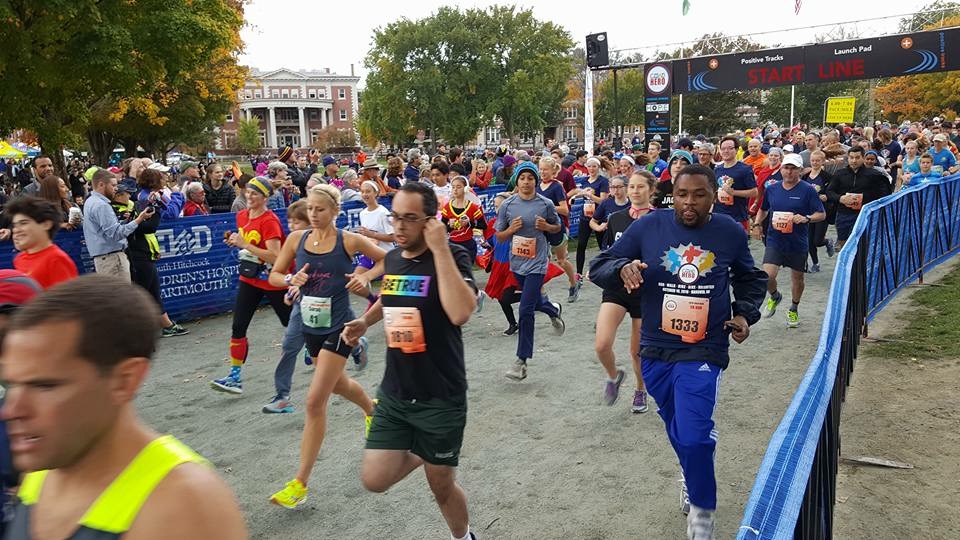6 Tips to Pace your Next Half Marathon
The ability to properly pace a half marathon can sometimes feel elusive. We all know that the smart thing to do is start slower and finish faster. But actually executing that plan is a totally different thing
With a full training cycle complete and your adrenaline pumping, it is easy to go hard in the first few miles. You're feeling ready to take down your goal time in record fashion. Fast forward a few miles and that initial burst of energy has worn off. Not only are you no longer on pace, you're starting to slow down and you can feel that goal slipping. You get discouraged and the negative mental talk starts to sink in. A few miles of this and by the time you hit the ten mile mark, you've all but given up. You'll finish, but you won't be anywhere near where you wanted to be.
Sound familiar?
If it does then it's time to take a look at your half marathon training, race day prep and pace plan. Here are a few tips to get you rocking your next 13.1:
Incorporate Race Pace Runs into your Training
Running at your goal race pace (the pace at which you need to run to reach your goal) is important to learning proper pacing. If you're looking to run a 1:45 half marathon then your "goal race pace" would be 8:00 min/mile. You can incorporate race pace miles into your weekly long runs. For example, if your training plan calls for a 10 mile run, warm up with three miles at your easy run pace. Then run four miles at goal race pace. And finally, finish off your run with three more easy miles. You can also "tune up" on race week with 3 miles at race pace (one mile warm up and cool down) four to five days before your race.
Start Slow
Unless you have done extensive training at your goal race pace, then you really need to start conservatively in the first few miles. It can be hard to start slow, especially when you're coming off your taper and have all the adrenaline and excitement of race day tempting you to let your legs go. But going a little slower at the start can make a huge difference with how you feel in the final miles of your race.
Run the first two to three miles 15-30 seconds slower than your goal race pace.
[Tweet "How to pace your next Half Marathon: Starting slow can help you finish strong. "]
img_4455
Break it Down
With long distance races, like half marathon it's best to break down the race into manageable chunks. Often you can do this by studying the race course. The terrain can often dictate how you run the race. Here are few suggestions as to how to break down your half marathon (but don't forget to do a little course recon).
Miles 1-3: go easy
Miles 3-7: focus on steady effort
Miles 8 & 9: check in and gauge whether or not you'll be able to pick up the pace for the last three miles
Miles 10: begin to pick up the pace
Mile 11-13.1: focus on slowly increasing your effort. Ask yourself, Can I give a little more? With a half mile remaining give everything you have for a hard run into the finish
Don't be a Slave to Your Watch
Sometimes when you're shooting for a PR you have a specific pace in mind and your eyes are glued to your watch trying to stick to that pace. Most courses feature varied terrain. You'll run up some hills and you'll run down some hills. When faced with varied terrain it's best to go by perceived effort for your middle miles. Yes, you want stay close to your goal pace, but if you're struggling to keep that pace up a hill you'll be hurting in the end. Remember that if you're using the downhill to your advantage the slower uphills will all average out in the end.
Finish Strong
The ultimately goal is to feel strong as you approach the finish, instead of slowing down. If you've started slow, paced evenly through the middle of the race then you should still have something left to give in the final miles of your race. I'm not saying those final miles will be easy, you'll probably have to fight and dig deep. But smart pacing for the first part of the race should allow you give more at the finish.
As you begin picking up the pace at mile 10 choose a runner ahead of you and "reel them in" one step at a time or choose landmarks along the course and push towards those marks.
CHaD HERO Half Marathon Run Far Girl
Mental Toughness
If you feel like you're doing all the right things when it comes to your training and pacing, but you're still coming up short, you may need to take a look at your mental game. If you're digging deep and giving everything you have, racing is difficult no matter how fast you are. Your body will do whatever it can to try to keep you comfortable, starting with your thoughts. To push through the discomfort of racing you'll need positive thoughts and mantras to keep you going when doubt creeps in.
For more tips on upping your mental game, check out these mental workouts for runners HERE.
[Tweet "Prepare to nail your next #halfmarathon with these tips #raceready #womensrunning"]
It's important to remember that even the best pacing strategy cannot make up for a lack of training. If you're shooting for a specific goal it's critical that your training adequately prepare you, otherwise you'll end up disappointed race after race. Your training should include the weekly mileage and pace-specific workouts to support your goal.
But if you've done the work and incorporate these tips into your next race, you'll be poised for a PR.
[Tweet "6 Tips for Pacing your next Marathon or Half Marathon #trainingtips #running"]
Have you run a half marathon recently? How was your pacing? What factors do you think influenced your pace?
--Sarah
Have more questions about training and pacing? I'm a certified running coach through the RRCA and USATF, I'd be happy to coach you toward your next goal!
I love connecting with readers! You can find me here:
Email: RunFarGirl [at] gmail [dot] com
Twitter:@RunFarGirl
Instagram: instagram.com/runfargirl
Facebook:Facebook.com/runfargirl262
Pinterest: pinterest.com/runfargirl
Daily Mile:dailymile.com/people/scanney


